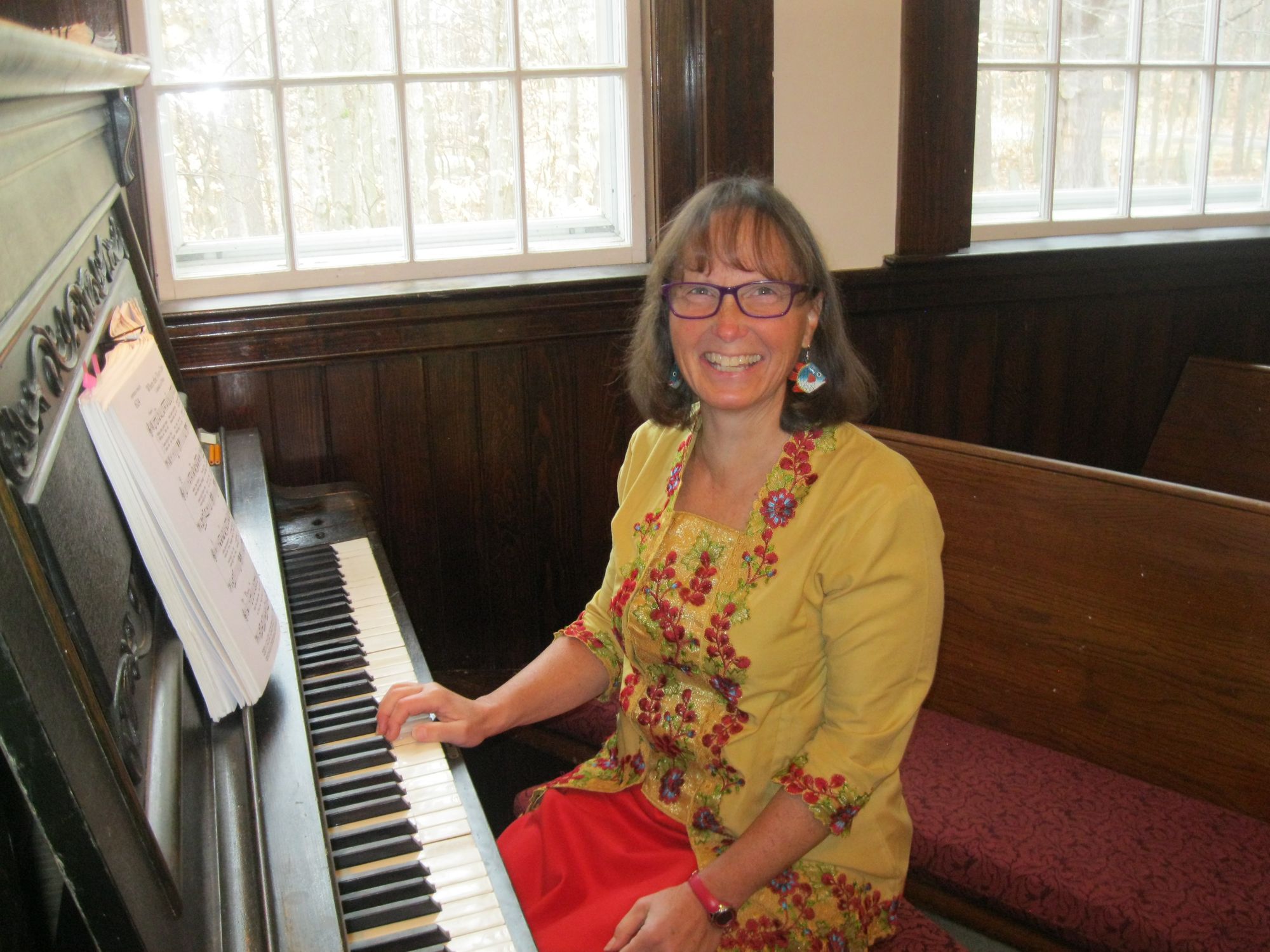By Heather John Fogarty
This continues our series highlighting women whose work and activism are helping immigrants caught in the dragnet of our country's immigration system.
Nancy Pierpont is the chair of the New Hampshire Conference United Church of Christ Immigrant and Refugee Support Group.
Heather John Fogarty: When did you first become involved in immigrant rights?
Nancy Pierpont: My involvement grew out of my congregation, now called Madbury United Church of Christ, sharing a church building with an Indonesian congregation now called Maranatha Indonesian United Church of Christ. The NH Conference of the United Church of Christ formed an immigration study group as a result of our Indonesian friends having their congregation virtually cut in half in the early 2010s, which turned out to be a result of actual and threatened deportations. The study group, now called the Immigrant and Refugee Support Group, was formed to understand what was happening to our Indonesian friends as well as immigrants of every nation.
HJF: What kinds of resources do the NH Conference of the United Church of Christ Immigrant and Refugee Support Group offer to immigrants?
NP: The group provides financial assistance for detention, bond and post detention support and is about to begin looking at offering legal assistance support as well. We have also been instrumental in growing host home networks throughout the state.
HJF: What is the most urgent issue the pandemic has created for housing immigrants?
NP: Protecting detained people from the virus. At first there was no testing available for immigrants leaving the [Strafford County] facility. They were given temperature checks, but there were no COVID-19 tests happening. We decided we needed to quarantine immigrants as a matter of public safety. Our main aims were to allow COVID-vulnerable immigrants to live in a safer environment and to depopulate the jail with those releases in order to decrease the chances that anyone living or working there would become infected. That would consequently decrease the COVID risk to the surrounding community.

HJF: I imagine that physical distancing during the pandemic has created increased risks in facilities. What protocols are in place to reduce the spread inside detention facilities?
NP: Nationwide the main problem is that physical distancing is not possible and too many people don't have access or won't avail themselves of masks. Also soap can be in short supply and handwashing stations can be hard to access. I've heard some advocates call the immigrant detention centers tinderboxes just waiting to go up in the proverbial flames of COVID-19. Death traps is another apt word.
Our facility has done an excellent job of taking precautions keeping people with any symptoms in negative air flow rooms, physical distancing, masks, etc., but health experts let the community know that all the precautions in the world were still not enough to keep the virus out, especially when it became clear from resident testimony that the protocols were not all being followed. We learned that ICE was transferring people into the facility who were infected and physical distancing due to the facility layout was difficult at best.
Our facility superintendent Chris Brackett therefore asked ICE to stop transferring any people coming from facilities with active COVID-19 into Strafford County Department of Corrections. And the assistant field office director at ICE, Alan Greenbaum, temporarily halted the AIR opps. Immigrants deemed vulnerable to the disease and worthy of release (who didn't present a danger to the community) were indeed released by Federal District Court Judge Landya McCafferty but some of those immigrants were placed on house arrest and given ankle monitors to minimize flight risk. Any immigrant advocate, however, can tell you that compliance without any of these restraints is very high and that ankle monitors are psychologically damaging.
HJF: How effective have these measures been at reducing the spread of COVID-19?
NP: At least for a while those hearings and decisions made by the players in them were effective in reducing the spread of the virus. Players were the ACLU of NH that filed the lawsuit, Federal District Court Judge Landya McCafferty who granted hearings for all COVID-vulnerable immigrants, the people who gave testimony—jail superintendent Chris Brackett, the ICE field office director Alan Greenbaum, the nurse practioner at the jail Tracy Warren and, of course, the immigrants themselves. I was disappointed to learn recently that the immigrant population is increasing again.
HJF: What additional challenges does COVID-19 presents for offering post-detention support?
NP: Finding someone who is willing to host is more challenging in these times of the pandemic. Many who have stood up in the past are in the vulnerable age group for COVID-19. We began to discuss this at the NH Immigrant Solidarity meeting in April and came up with two models of quarantining immigrants, either in empty faith buildings or in motels. When we got wind of the fact that the ACLU was going to have a COVID-based lawsuit we immediately started talking with other groups and looking around to nascent and existing home host networks asking what kind of capacity they would have. For example a group from Concord, including the Kent Street Coalition and the Unitarian Universalist Church, had been in the process of looking at forming a short term host home network and were able to switch gears quickly, lending quarantine support to immigrants leaving Strafford County. In the end, we had 12 different placements ready and available at the beginning of the outbreak.
HJF: You’ve been instrumental in growing a successful support network in New Hampshire.
NP: There are a lot of people who are very concerned about immigrants. The first step is to learn about immigration, through a variety of programs, and to gather people who might be interested. The various organizations in NH who work on immigrant advocacy convene regularly at least once a month. The NH Immigrant Solidarity Network facilitated by the Granite State Organizing Project had been scheduling regular immigrant solidarity vigils and meetings with many NH congregations prior to COVID-19 to discuss how best to support immigrants and get at root causes of immigration and how to fix our broken down systems. We’re very well glued together in NH. It’s a result of that teamwork that made it possible to quickly discuss what would happen to immigrants eligible for release during the pandemic.
HJF: You mention coordinating with other faith groups. How could this model prove effective in other parts of the country?
NP: As my mentor Eva Castillo from the NH Alliance for Immigrants and Refugees would say "it's all about relationships." I'd recommend that immigration advocate groups in a given state (or area if it's a large state) make the effort to get to know each other. That way when something happens, you’re already connected and can convene meetings to react quickly. Because the NH advocacy groups had already been convening regularly and knew each other we were able to get the quarantine capacity off the ground very quickly. As designated project leader of the Immigrant and Refugee Support Group I was able to send a letter to the federal district court judge outlining the placements available so that the judge who was hearing the cases would feel it was safe to release the immigrants. We wanted her to know there were quarantine placements available so she would have no safety obstacle to releasing the immigrants.
HJF: What can other communities do to help?
NP: See if a local mosque, church, or synagogue will lend their empty faith buildings or pay for a motel.
Set up a support team for food drop offs and clothing runs. It takes time but it's not rocket science. This has been a tremendous source of joy for the faith communities to have such a project which helps someone during the pandemic. We recommend supplying a smart phone, iPad or laptop so the immigrant is even less isolated.
HJF: What guidelines are in place for your support team?
NP: We have short guides for a motel model for quarantining available from our Seacoast Interfaith Sanctuary Coalition, as well as guidance for volunteers picking up immigrants, such as bringing additional masks, making sure there is a lot of ventilation in the car and quarantining yourself for two weeks afterward. Additionally, one of the things that can be helpful is distance visiting with a mask on so that the immigrant feels less isolated. Released immigrants will want to share their joy at being free and their dismay at how badly our immigration system has treated them.
Here is a poem written by IRSG team member BJ Lates that captures how simply listening to each other is a wonderful two-way gift:
"Here is a man,
His family half a world away,
Worn down from abuse inflicted on him in our name.
Here is a man who has lived through pain and fear
Both in his homeland and here
Who asks: “Why would they be so mean?”
Here kneels a man
Who shares his experience with God
Now closer to him than ever before.
The God that somehow,
Even EM doesn’t really know how,
Saved him from that plane ride to a most certain death
In his warring country.
Here stands a man
Sharing his story
With a sense of wonder
Repeating his journey yet again
For us to hear and for him to analyze.
Here stands a man
Willing to share his heart
With two strangers who by now are heart mates.
God’s ways are not our ways
We need only to stop and listen
And with great, humility, to take it in.
Here stands a man
Open to sharing his life
And offering us the opportunity
to share in God’s amazing work."
Heather John Fogarty is a Los Angeles-based writer whose work appears in publications such as the Los Angeles Times, Marie Claire, the Hollywood Reporter, and has been featured on NPR. She currently teaches journalism at USC Annenberg.
Cover photo, left to right: Maggie Fogarty of the American Friends Service Committee, Etty Tham, Rev Sandra Pontoh of NH Indonesian Community Support and Nancy Pierpont of the NH Conference United Church of Christ Immigrant and Refugee Support Group.
Etty Tham is a grandmother who was picked up at a NH checkpoint over Memorial Day weekendof 2018 while vacationing in northern NH with her US citizen family. She was held in immigrant detention for over 7 months while her granddaughters and mom struggled to carry on without her.
Editor's note: Guidelines for post-support release have also been published by Presbyterian Disaster Assistance.

